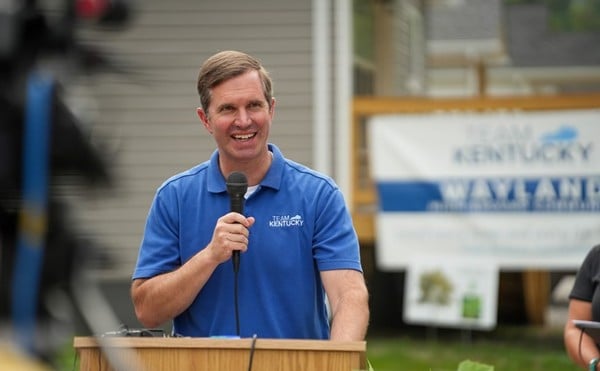The usual rancor of Washington was momentarily silenced after the shooting of U.S. Rep. Gabrielle Giffords, D-Ariz., earlier this month in Tucson, where a lone gunman opened fire in an area where the lawmaker was meeting with constituents.
While Giffords is recovering from a gunshot wound to the head, the nation is going through a therapeutic session about its political tenor at the beginning of what observers predict will be a bitterly partisan year in Congress.
“When Speaker (John) Boehner said an attack on one is an attack on all, that was taken to heart. People are saying to each other: ‘Yes, we have differences, but we do have a lot more similarities, and we’re all trying to do the same thing in different ways.’ You feel that as you walk around,” says U.S. Rep. John Yarmuth, D-Ky., a friend of Giffords. “The standard rhythm of these things is people are changed for about a month, and then we revert to our normal behavior. I hope that’s not the case.”
For Yarmuth, the new political reality will be daunting considering Republicans have a firm 242-193 majority grip in the House. And with Democrats barely holding onto the Senate and a White House comfortable in the political middle, very little substantive legislation will get passed over the next two years.
Entering his third term, the liberal congressman from Louisville will be in the minority for the first time, dealing with a GOP that intends to buttress the conservative talking points of its freshmen members and reverse much of President Obama’s agenda. The shift in power will significantly change Yarmuth’s role in Congress and test his ability to defend his priorities while leveraging federal resources for the district.
“Yarmuth will face challenges, there’s no doubt about that, but he’s proved to be somewhat independent,” says University of Louisville political science professor Dewey Clayton. “After the tragic incident in Tucson and the president’s speech at the memorial calling for everyone to tone down the political rhetoric, it’s going to be interesting to see how Congress moves forward and if there’s going to be more of an effort to come together to do the people’s business as opposed to just playing politics.”
The 112th Congress also marks the first time in over a decade that Kentucky’s 3rd congressional district seat has been in the minority, meaning it will be more difficult to attain much-needed federal funding for local initiatives.
After the general election in November, Tea Party-backed candidates pushed to end the dubious earmarks process that attached billions in federal spending for specific projects to pieces of legislation, making a minority member of Congress appear all the more ineffectual. But Yarmuth tells LEO that shouldn’t inhibit his ability to bring federal resources back to the city.
“In a sense, I may be in a better position just by being in the party of the administration,” he says. “Since the earmarks are being done away with, the ability to designate appropriations is gone, which means all of the federal money available is in the respective agencies. The ability to speak with people who are working for the administration is a little bit of an advantage. That is one thing that has nothing to do with minority versus majority.”
When the House returns this week, however, Republicans intend to immediately move to repeal the previous Congress’ biggest accomplishment — health care reform.
The measure is expected to pass the House easily but stall out in the Democratic-controlled Senate, and President Obama already has threatened a veto. And while reopening the divisive debate from last year feeds their base of Tea Party supporters, public support for repealing the sweeping reforms has fallen dramatically.
According to a recent Associated Press poll, only one in four Americans supports full repeal of health care reform, which would add $230 billion to the deficit by 2021, according to the non-partisan Congressional Budget Office.
Meanwhile, emboldened Republicans have offered no alternative health care reform plan of their own.
“In this environment, what we’ve seen out of Republicans in both the Senate and now many of the new members in the House is there is nothing they want to do except unravel what we’ve already done,” Yarmuth says. “So our role becomes rather than trying to accomplish anything, we’re trying to protect what we’ve done in the past. That’s what we’ll be committed to doing over the next two years.”
The predicted political stagnation means Yarmuth and fellow Democrats will be playing defense as debates are expected to heat up over a number of issues, particularly around the national deficit.
In January, the country’s federal debt hit an all-time high at $14 trillion — a whopping $45,300 per person. That leaves Congress with two options: raise the legal debt ceiling to give the government a higher credit limit or dramatically cut spending to stay under the current cap.
Among small-government conservatives, defeating a new debt limit increase has become a chief priority for the GOP and Tea Party movement despite warnings of another recession.
“This is extremely important because it’s burdening future generations with what we deem as unreasonable and unfathomable debt,” says Cordell Lawrence, vice-chairman of the Jefferson County Republican Party. “If we continue to do that it will further hinder us as far as being the top country in the world from a financial standpoint. It’s been a longstanding tradition, particularly on (Yarmuth’s) side of the aisle, to just think you can borrow your way to prosperity, and that is unrealistic and unsustainable.”
The congressman is firmly in favor of raising the ceiling to avoid what he calls “economic catastrophe.”
As for what Yarmuth expects during the next two years in Washington: “That debate is going to be largely theater, but it’s a useful one to have because the American people will get past the rhetoric. The Republicans will have ownership of an agenda and will have to identify the things that they’re going to cut.”





